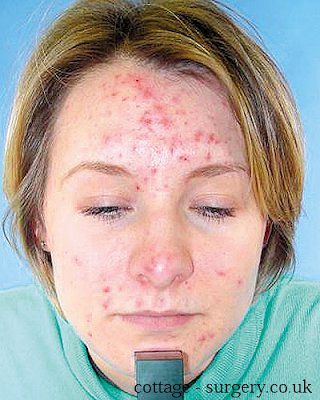Acne usually occurs in teenagers and is due to hormonal changes during puberty (increase level of androgen), increase level of keratin and sebum production during adolescence. This is because the excessive sebum can encourage the growth of bacteria, e.g. Propionibacterium acnes. Young children present with acne should be referred as this is extremely rare. Rosacea is different than acne as rosacea only affecting face characterised with reddening and papules.
Lithium, phenytoin, progestogens, levonorgestrel and norethisterone may precipitate acne. People with acne which do not respond to treatment within 8 weeks should be referred to doctor.
Acne Treatments are available in lotions, creams and gels. Gels contain of alcohol base and dry very quickly, causing irritation. Aqueous base however dry slower and less irritating. Gels are suitable for oily skin while cream for dry skin. One of the treatments is benzoyl peroxide, which is best used after washing face and rinsed off with water. Benzoyl peroxide prevents new formation of acne rather than shrinkage the existing one. People using this should be warned about its stinging, drying and peeling effects. It is best to use at lower strength, 2.5% and increase gradually after 2-3 weeks. Contact of benzoyl peroxide to eyes, mouth and other mucous membranes should be avoided.
Antiseptic agents, e.g. chorhexidine that present in some soap have degreasing effect and reduce the skin flora.
Oral antibiotic such as erythromycin is also used in the treatment of acne but it has high bacteria resistance, therefore it is more recommended using trimetroprim which has less bacteria resistance. Apart from that, minocycline is also commonly used due to its lower resistance and better absorption which only required a dose once daily. Patients should be reminded not to drink or eat any dairy products up to 1 hour before or after taking the antibiotic.
P/s: The use trimethroprim above is an unlicensed indication.
Practical points
Acne is a chronic skin condition which require up to 6 months for the treatment to elicit full benefit. Therefore, patients are encouraged to maintain using the treatment and not to be discouraged if the results are not immediate. Continuous treatment is essential.
Patients are advised to avoid taking any topical hydrocortisone as the steroids can potentiate the effects of androgenic hormones, causing acne worse.
0 comments:
Post a Comment